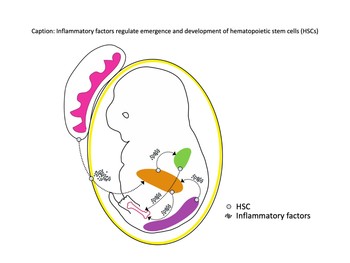- HOME
- News & Events
- Books / review / comments
- 【Books/review/comments】Development of the hematopoietic system: Role of inflammatory factors
Books / review / comments
【Books/review/comments】Development of the hematopoietic system: Role of inflammatory factors
March 27 2019
April, 2019
Hitoshi Takizawa
Paper information
Yoshikazu Hayashi* Maiko Sezaki* Hitoshi Takizawa
*contributed equally to this study
Wiley Interdiscip Rev Dev Biol.
2019 Mar 27:e341.
doi: 10.1002/wdev.341.
PMID: 30916895
Graphical abstract
Inflammatory factors regulate emergence and development of hematopoietic stem cells (HSCs).
Abstract
Hematopoietic stem cells (HSCs) have two defining features, multipotency and self‐renewal, both of which are tightly controlled by cell autonomous programs and environmental factors throughout the lifetime of an organism. During development, HSCs are born in the aorta‐gonad‐mesonephros region, and migrate to distinct hematopoietic organs such as the placenta, fetal liver and spleen, continuously self‐renewing and expanding to reach a homeostatic number. HSCs ultimately seed the bone marrow around the time of birth and become dormant to sustain lifelong hematopoiesis. In this review, we will summarize the recent findings on the role of inflammatory factors regulating HSC development, that is, emergence, trafficking and differentiation. An understanding of HSC kinetics during developmental processes will provide useful knowledge on HSC behavior under physiological and pathophysiological conditions.

